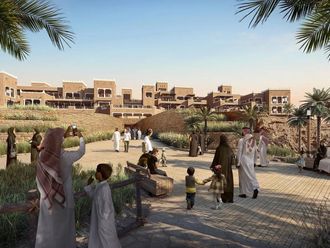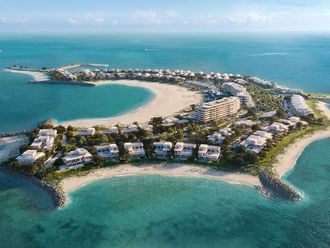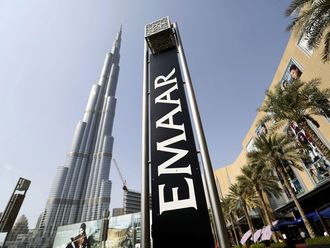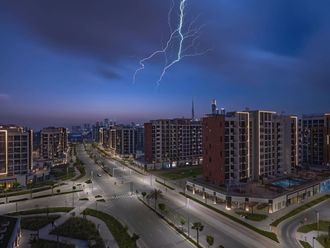Dubai: More than 600 residents in The Palm Jumeirah’s waterfront apartments have just lost direct access to the beach after real estate developer Nakheel closed off a portion of the trunk’s shoreline to pave way for a mega development.
Workers commissioned by the master developer of the world’s largest man-made island started fencing off the coastline on the western side of the Palm Jumeirah’s trunk on Sunday, as plans are afoot to build a brand new beach. The barricade, built on the stretch of sand outside Fairmont Residences South, is about one kilometre long, and is expected to reach all the way to Fairmont Residences North.
Both mid-rise luxury developments, comprising mostly of apartments and some penthouses, are under the portfolio of IFA Hotels and Resorts, which earlier figured in a commercial dispute with Nakheel over two other properties on the island.
“This area has been fenced off in order for Nakheel to begin construction of the Palm West Beach project. This includes major enhancements to the island, including construction of a new beach, park, café and restaurant complex and the creation of The Palm Promenade,” a Nakheel spokesperson told Gulf News.
The Palm West Beach project is Nakheel’s new park, dining and beach club facility for the island that will include the construction of 500 underground parking spaces. It is part of 1.5-km Palm Promenade, which will transform the whole trunk and link residential buildings on The Palm with Al Ittihad Park, Palm West Beach, Golden Mile Galleria and other upcoming attractions.
When asked whether the closure was only temporary and that the beach will be reopened to residents once the project is completed, Nakheel said the beaches of Palm Jumeirah “are not public spaces.” “As with other beaches on the island, use of Palm West Beach will be available to those with authorised access.”
The sudden beach closure surprised people living in the beachfront community and left many investors disappointed, especially those who have paid a fortune for uninterrupted views of the sea or the Dubai Marina skyline.
“There’s a lot of frustration among tenants and property owners in the area,” said Barry Gale, a real estate adviser, adding that the move can have negative repercussions on the market, as it can fuel properties to fall in value. “If it continues, it will have an effect on prices.”
In October 2016, around 1,000 residents in two buildings on Palm Jumeirah’s shoreline development were denied entry to the beach after IFA reportedly failed to pay the dues for beach access. The publicly listed Kuwaiti company is the sub-developer of a number of properties on the island and is said to be the Palm's largest foreign investor.
But realty experts said that beach closures aren't new to Dubai, as new projects are being proposed, constantly changing the emirate's skylines.
In Dubai Marina, a number of properties along the shoreline have cropped up, including The Beach development at Jumeirah Beach Residence (JBR) and the ongoing beachfront hotel project which will feature a pair of 74-storey towers.
“Time and time again we’ve seen owners of waterfront/waterview/water access properties being disappointed when the coastline is extended and now a 75-storey tower suddenly pops up seemingly overnight,” noted Lukman Hajje, CCO at propertyfinder.ae.
“Views are never guaranteed anywhere in the world but seemingly much less so in Dubai. In more mature markets, there are excessively strict regulations which dictate what can and cannot be built. Even minor renovations/extensions can take months to get approved in London, Sydney and virtually every major city,” Hajje told Gulf News.
Jesse Downs, managing director of Phidar Advisory, said that many investors fail to price in various risks that come with investing a property in Dubai, adding that uncertainty about future development plans is a key consideration often overlooked.
“So, any incomplete master development has this risk and, given the prevalence of reclaimed land, even some completed areas have this short-term risk. In the long term, redevelopment also becomes a possibility, but this market is too young for this to be a serious concern now,” Downs said.
“We always knew the Palm would be fully developed eventually. Those empty plots are private property and not a communal amenity. However, there are also many examples of stated plans not materialising. Investors should always be vigilant with the purchase agreements and do their own research on developer and master developer track record,” she added.
Frank De Baat, board member of the Home Owners’ Association, said the latest beach closure has affected more than 600 residents and caught them by surprise. He said they were never notified by the developer in advance, although they were already aware of the impending development.
The next course of action will be for property owners to sit down with IFA and the developer in order to come up with a fair deal. “I’m not against this development. I think this project, in general, is good. This is going to be similar to The Beach in JBR, with underground parking and restaurants,” he told Gulf News.
“But there’s just no proper communication with the residents. We were never informed. Just recently, the majority of home owners voted to push for a mandatory beach membership during our meeting, then two days later the beach access was gone.”
Residents can't have it both ways, though, especially in a market that's growing at a rapid pace. "All Dubai residents enjoy the breakneck speed at which wonderful, new, world-leading developments, hotels, attractions and infrastructure are constantly being developed in this city. It's like nowhere else on earth," said Hajje. "It wouldn't be possible anywhere else. Red tape and legal restrictions would prevent it."












